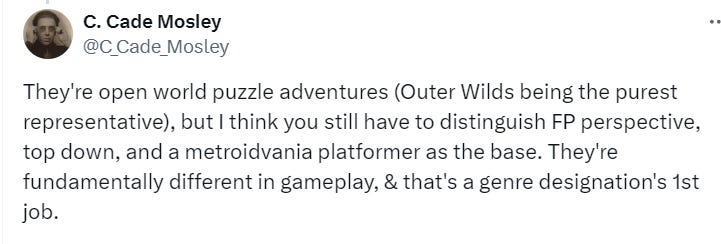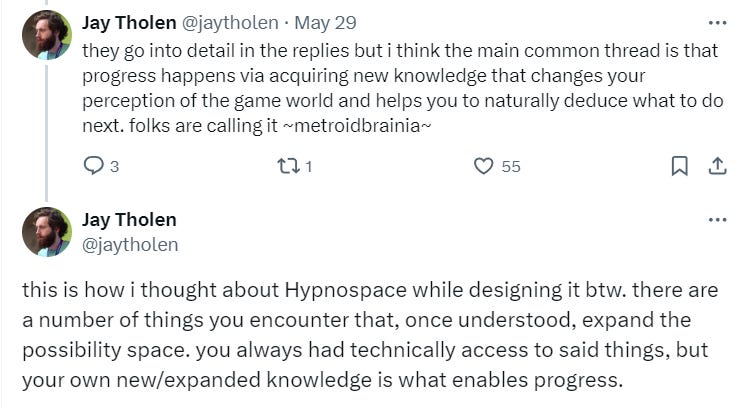So, what *are* we calling these?
My tweet popped off
About a week ago I tweeted this out:
It spread, uh, maybe a bit further than I was expecting:
Now that I’ve had some time to mull over the reactions, I thought it might be fun to revisit them after presenting a more complete thesis.
It’s not unexpected that a lot of people’s default assumption was that I was trying to identify some kind of subgenre. Truthfully though, I didn’t have anything so definite in mind. In the replies to the original tweet, I included a list of characteristics which I picked out as the set of combined elements which I thought tied these games together in my mind:
Exploration-focused.
Very "free", open-ended traversal.
Very hands-off tutorialization.
Major content locked behind secret, optional, and often difficult puzzles.
"Layered" secrets, "endings" that aren't really endings.
Rich lore is present or heavily implied.
Game knowledge is a major part of progression, veteran players can breeze through off knowledge alone.
Minimal focus on action gameplay; action challenges, if any, can often be circumvented with tools/knowledge gained from exploration.
Often features small puzzle-solving elements separate from wider exploration.
Players often describe their experience with these games as deeply meaningful and/or mind-blowing.
I was pretty much just trying to draw a circle around games which share all of these characteristics; even at the time, “subgenre” didn’t really feel like an appropriate label for the category.
So, what was I even searching for? We’ll get to the snappy label in a second, but if I now had to summarize the core thing that these sorts of games have in common it would be this:
Each game involves the player mastering a bespoke, predictable, and systemic environment as a whole, primarily through the open-ended and unguided gathering of knowledge.
As promised, let’s test this thesis by responding to some of the replies to the original tweet. I’m sure everyone’s put just as much thought into this important question.
Thanks guys.
On a meta note, while writing that tweet I do recall heeding a raspy, goblin-like voice saying “phrase it like thisss, it will bring more engagement!” so I suppose I set myself up for this. And the tweet probably did spread a lot further than it would have if I had instead made a rambling thread full of caveats and clarifications. Which is probably… good? Yeah. Probably.
I feel this is a kneejerk reaction to certain people trying to make these kinds of categories more authoritative than they have any right to be, and I understand wanting to push back against that. But I hope I made it clear that there is something worth pointing to here, and not all efforts of this kind are pointless navel-gazing. As I touched on in a reply to grayfruit, I don’t think that we would be seeing the same level of experimentation, iteration, and ultimately results we see with metroidvanias if “metroidvania” wasn’t a coherent category with a lot of shared understanding around it. Without a cultural touchstone like this, quickly communicating what your game is trying to do (to collaborators, investors, audience, etc.) just becomes harder at every level (often we’re forced to rely on examples of existing games, and tough luck if they’re not really well known).
Having enough of a shared language that those unfamiliar can use to get an initial grip on things is valuable. As a younger medium, I think games have a lot of design space left to explore compared to stuff like literature or film, and I think a willingness to map things out will help us find foundational conventions, wisdom about what truly works, faster.
(and many more along these lines)
I’m not sure how many of these people actually took time to look at the list of similarities, but they do have a bit of a point: on the surface, the games presented play very differently. This is most of the reason why I don’t think the categorization is quite a “subgenre”. The core idea can evidently be applied to many different gameplay styles, though it does seem to mesh best with puzzle games (in the ‘bite-sized puzzle’ sense).
It does feel to me like other people are able to pick up on the shared heart of these games, given reactions like this:
And people managing to point out other examples that nail it:
But a wise man (who sleeps on my couch) once said you find what’s interesting about things by seeing how they differ from other things, rather than pointing out similarities. In that spirit, I did try to point out some games that I think fall just shy of this category and why:
Inscryption: Too linear, not enough 'free' exploration, too strategy focused.
Cave Story: Too linear, not enough exploration focus, progression is not so heavily based on game knowledge, too action-focused.
Paradise Killer: "Puzzle solving" is too straightforward, mostly a collect-a-thon.
Return of the Obra Dinn: Does not feature hidden "layers" of content, the method of exploration and discovery does not break much from expectations set at the start of the game.
Baba is You: Not particularly lore rich.
Stephen's Sausage Roll: Outright "hidden" content is minimal.
Undertale: Main game is too linear, "open" exploration elements are minimal.
The Stanley Parable: No real puzzle-solving to speak of.
Some other games people brought up also felt similar but ultimately separate to me, I’ll take the opportunity to go in-depth as to why:
Dark Souls titles, while featuring quite a surprising number of traits from the original list, are fairly easy to exclude simply due to their segmentation and linearity. The world as a whole is never turned into a puzzle for you to solve.
Elden Ring was admittedly harder to exclude; it does have a well-executed open-ended exploration aspect, and quite a pile of secrets and knowledge to collect. In its case, I think it’s simply a matter of where the focus lies. Progression in Elden Ring is not solely or even primarily based around knowledge, i.e. investigation, cracking the world’s puzzle, etc. RPG-style character building and the development of your action-based combat skills play a much larger role; this is ultimately what sets it apart from the original set of examples.
Well said gorillastats. Disco Elysium… it’s feels close. But despite all the freedom the player is handed, it’s all concentrated in how the moment-to-moment gameplay unfolds. In most playthroughs, all the same scenes will occur, even if their exact contents and order might be shuffled around (and give-or-take some optional questlines). And you’re never really alone in your journey to unravel the game’s mysteries, thanks to the more-or-less friendly NPCs you’re always talking to, as well as… the player character?
Yeah, that’s the other glaring thing, you’re not quite the one doing any puzzle solving, you’re roleplaying as a character that does so. There is no real systemic overarching environment to be analyzed and conquered, but rather a (skilfully woven) web of fiction the player gradually traces to its inevitable conclusion. That’s what sets Disco Elysium (and many other “adventure” games) apart.
Er, nowhere did I claim that games in this category are inherently better or worse than others, there are plenty of games on the “not” list that I like more than some out of the 7 original examples I gave.
Regardless, I wanted to bring up Obra Dinn since I think what distinguishes it is telling. It does seem to check a lot of boxes, so why doesn’t it fit? I think my response to the previous reply hints at what’s going on here. While Obra Dinn has something of an overarching system, deciphering it is not where the game’s challenge lies. All the important rules are freely presented to you fairly early on, and you are left with a very clear set of goals to accomplish. Heck, the game even hands you a comprehensive list of blank fields to be filled in as you go.
This is in contrast to the original example games, who are unguided; you’re always expected to fathom yourself not just the world and its history, but the very rules of the game you’re playing. Each discovery in this realm drastically shifts your perspective and recontextualizes your entire playthrough thus far, and the games are usually structured such that you come to these realizations at an interesting pace. These realizations, discoveries, perspective-shifts, one might even call them… epiphanies…
So, even I felt Rain World was a bit of an outlier in the original list, and now I think I can put my finger on why. It’s closer than any of the other examples of “almost” games I’ve presented thus far (obviously, since it managed to sneak onto the original list lol), but there’s one clear difference I can point to now between it and the other games. Rather than being entirely bespoke and predictable, its system is partially generative and non-deterministic.
Let’s use an example: in Outer Wilds, the developers (and eventually the player) can have complete knowledge of the solar system’s workings. Barring glitches and player interference, every celestial body will be in a known position at a any given time, every machine in the game will work the same way every time it’s used, and events and changes can be predicted with perfect accuracy. This means that any knowledge of the system that the player obtains is immediately and clearly applicable and reliable.
Conversely, in Rain World, a large and critical part of the game’s overarching “system” is its dynamic ecosystem. Animals all have their own AI will behave unpredictably in response to the player, the environment, and other animals. The ecosystem also exists and progresses independent of the player, which means the world and its inhabitants might undergo significant change while you’re not looking. While there are still rules to discover, significantly more experimentation might be necessary to do so, the knowledge earned is harder to apply reliably, and few things ever become truly 100% predictable.
Is this difference enough to disqualify rain world? Maybe not, I don’t think it’s necessarily satisfying a completely different internal drive, and it does feel very similar to the other examples. Still, there is a clear difference, and I think it might be worth further distinguishing these sorts of “emergent sim-y” takes on the core idea for those who can stomach the nuance.
Alright, let’s see if anyone’s come up with a good, snappy tag for this sort of thing.
I don’t really think sticking them under a broad umbrella like this is really helpful. For example, there are plenty of titles I and others would happily deem “adventure games” that clearly don’t fall in or even close to the category. Similarly broad labels don’t fare much better in this regard.
I had some, ah, choice words for this one:
Not much more to say, though to expand on the first comment, the reason I think an overreliance on genre terms based on existing titles is corrosive (doubly so for genre terms like this which are based on existing genre terms of the sort) is that it tends to obfuscate what we actually care about in those titles and makes it unnecessarily harder to communicate with those who might be less familiar with those titles. Some mentioned the term “tunicwild”, the same criticism applies to that.
Now we’re talking. I think all these monikers do a good job pointing at the specific thing that makes these games interesting. But as we saw in the Obra Dinn counterexample, “layers” is not quite at the core of this feeling. Can we do better?
I’m pleasantly surprised people kept recommending that video, since it seems to frame ‘KBUs’ as just a mechanic that some games have, rather than any sort of genre tag. It’s definitely on the right track in that regard, and, as we saw, knowledge-based progression is crucial to the category definition. Even the Hypnospace designer seems to agree. Unfortunately, this term seems too narrow, and it’s pointing to a mechanic that many games have, not just the ones we’re trying to delineate.
Consciously or not though, it seems Jay might have independently hit upon what we’re looking for in his reply…
This feeling. These might not be the only sorts of games that can provide it, but I can’t think of any type of game that provides a stronger or purer form of it than this one. If one lacks time to get into the nuance, I think ‘epiphany-driven’ is great shorthand.
Good job, team!
So… was there anything else? Well, some people took my original 7 examples as being comprehensive, which is pretty laughable. Therefore, I’d be remiss not to offer some game recs! Let’s see what the public has to say:
Yes, yes, ok! I can’t believe I forgot Tunic when I was making the original image. It might be a good bit more action-focused than the other titles, but it definitely fits the bill.
Regarding Fez, it’s been a while since I last played it so I wasn’t sure how closely it fit. Still, I wouldn’t expect anyone who likes this sort of stuff to have a bad time with it, so go check it out!
Seconded. Solid recommendation. It’s similar to Baba is You in that it checks pretty much all the boxes but doesn’t quite have much in the way of lore for you to uncover. That aspect of things adds quite significantly to the feel and character of an epiphany-driven game, but at this point I won’t go quite so far as to call it absolutely essential.
Neither of these games quite land in the epiphany-driven bucket imo, but it’s interesting that Subnautica came up in my discussion of the topic with friends. If you want a not-quite-epiphany-driven game that leans more in a survival-sandbox direction, it might be the one for you.
Also, here are all the games that look interesting from the trailers but which I haven’t otherwise played or heard much about.
That’s all, but if you have recommendations of your own, comment below!



















































I got the term "Epiphany-driven" from the steam storepage for Lingo, which the dev quite possibly coined in response to the same "modeling epiphany" discussion you cited in this blog post.
For context, Lingo is an abstract puzzle game that very much follows a similar path as The Witness, but the small-scope puzzles are word puzzles, and the broader world context is abstract, geometric, and noneuclidian, more in line with Antechamber or Superliminal. The game doesn't have access to Jon Blow's art budget and development schedule, so it lacks a lot of the same polish, but it has a lot of heart, and goes pretty far for a single dev project. Highly recommended.